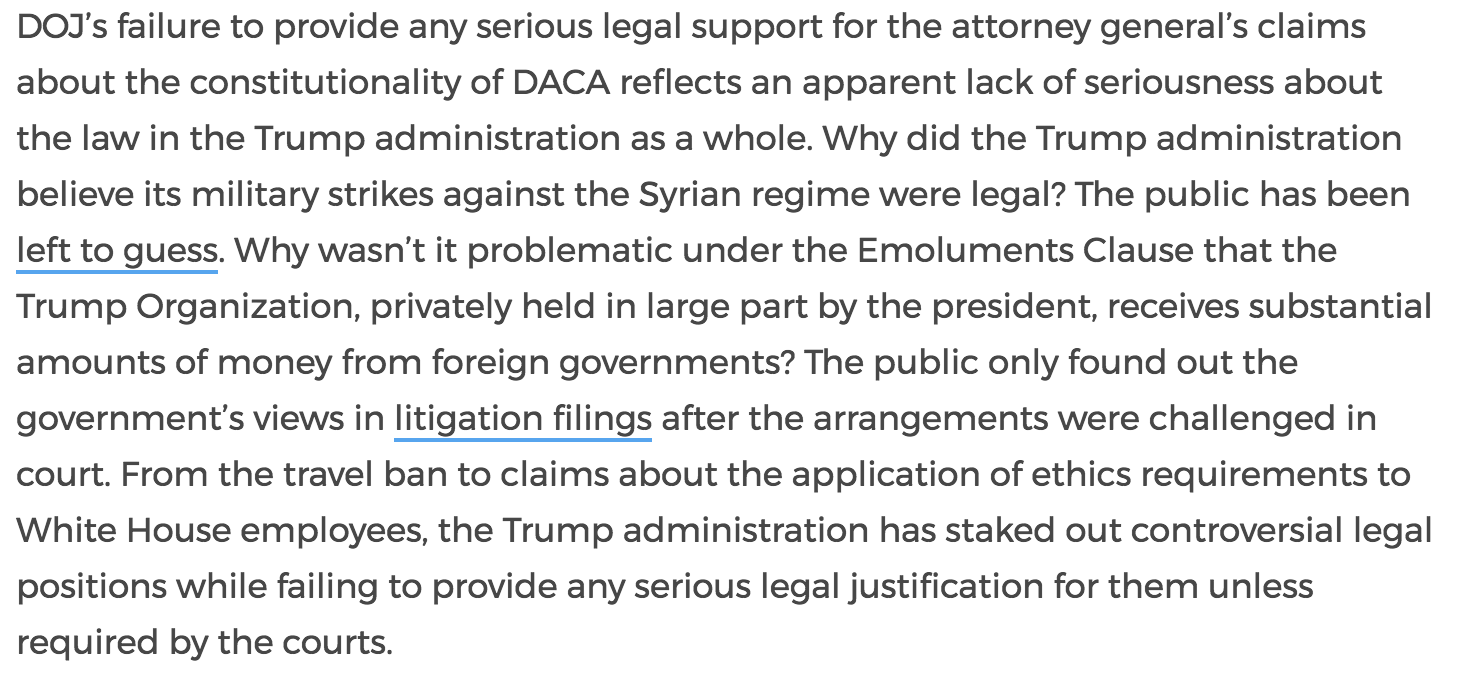DACA Announcement Reflects Lack of Seriousness About the Law
On September 5, Attorney General Jeff Sessions announced that the Deferred Action for Childhood Arrivals program (DACA) is “being rescinded” because it is “unconstitutional,” asserting that the policy has “enormous constitutional infirmities.” There may be an intense political debate about the policy merits of DACA, but the attorney general portrayed his decision not as a policy judgment but rather as a result compelled by law. What Sessions and the Department of Justice (DOJ) did not provide was a robust legal analysis supporting this contention.

By: John Bies, Chief Counsel
On September 5, Attorney General Jeff Sessions announced that the Deferred Action for Childhood Arrivals program (DACA) is “being rescinded” because it is “unconstitutional,” asserting that the policy has “enormous constitutional infirmities.” There may be an intense political debate about the policy merits of DACA, but the attorney general portrayed his decision not as a policy judgment but rather as a result compelled by law. What Sessions and the Department of Justice (DOJ) did not provide was a robust legal analysis supporting this contention.
This is a problem.
Normally when DOJ rests major policy changes on a legal determination, it explains the legal analysis supporting those decisions. Whether you agree or disagree with the Obama administration’s decisions to use military force in Libya, to expand the DACA program to provide deferred action to parents of U.S. citizens, or to cease defending the Defense of Marriage Act in court—each of these decisions was accompanied by a detailed legal explanation of the administration’s position.
Providing a public explanation of the administration’s legal rationale promotes government accountability and ensures that the public can evaluate the government’s legal claims. And the obligation to provide a serious legal explanation for the government’s position helps to prevent policy making driven by the ipse dixit assertions of politically motivated actors.
DOJ’s failure to provide any serious legal support for the attorney general’s claims about the constitutionality of DACA reflects an apparent lack of seriousness about the law in the Trump administration as a whole. Why did the Trump administration believe its military strikes against the Syrian regime were legal? The public has been left to guess. Why wasn’t it problematic under the Emoluments Clause that the Trump Organization, privately held in large part by the president, receives substantial amounts of money from foreign governments? The public only found out the government’s views in litigation filings after the arrangements were challenged in court. From the travel ban to claims about the application of ethics requirements to White House employees, the Trump administration has staked out controversial legal positions while failing to provide any serious legal justification for them unless required by the courts.
Normally, in the context of litigation, DOJ defends any statute or administrative action where there are reasonable arguments to defend it in court, not based on its own judgments about the ultimate merits. This standard is intended to prevent political actors at DOJ from substituting their personal judgments for a determination of the law by a court. The instances where DOJ has departed from this approach are rare, controversial, and deserving of a thorough explanation and public discussion.
The 2014 Office of Legal Counsel (OLC) opinion finding that President Obama’s deferred action program for parents of U.S. citizens is lawful rests on similar legal footing as DACA and is hard, if not impossible, to reconcile with the legal conclusions about DACA advanced by Sessions. There is no public indication that the opinion has been rescinded or replaced by OLC or expressly overruled by the attorney general. American Oversight has filed 3 FOIA requests with DOJ to determine if the 2014 OLC opinion remains the official position of the U.S. government and what legal guidance from DOJ’s career professionals, if any, Sessions used to inform his statements about DACA.